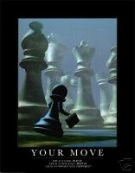spacious_mind wrote:As I stated I just think that Lang especially in closed passive situations begins to dither about and probably because of the highly selective search misses moves that could allow it to proceed favorably, but instead continues to dither around.
Yes. Totally agreed. This is definitely a weakness with the Genius program on my Windows 8 phone so I suspect it will be a weakness in the upcoming unit as indeed it is a weakness in the PC program if you give it a split second a move!!

This characteristic tends to fade on the PC program at long time controls but obviously the Mephisto machines and the upcoming Millennium simply will not have the CPU power needed to fully overcome this.
Like you I seem to have an easier time with the Lang programs as well. Mind you they are still much stronger than I am but I remember defeating a 32 bit Portorose Munchen at blitz and being quite surprised as I did not really need to think that hard at all. It was quite passive and made the win quite easy. And I am saying this as someone who has never, ever defeated a Mephisto MM IV at blitz. And in the games I have been playing against my Genius phone, it is pretty even until I eventually get ground down in the endgame. Infact, If I were to play the game in "parts" so I was totally fresh every 20 moves I think I could beat it. It's not really like my Nintendo Fritz where fireworks fly and I'm down a whole piece before the endgame no matter how hard I try.
So I think we actually probably agree more than you think.
I think in the end I would not want to own just a Genius program / dedicated. But owning that along with a hash table Novag / top of the line Schroder or Morsch and you have completely contrasting flavours.
I guess I think the way I do because no one has ever wiped me off the board in a swashbuckling display of aggressive fireworks (well, except for that darned
Klute). I tend to either win or die slowly. So I guess this is why for me the Langs emulate more my experiences against human competition. Of course, if people played against me like my Nintendo Fritz I'd likely start practising against that Chess system Tal at full strength and stuff the fact that I'd lose each and every time.
It would be interesting to see if anyone has actually done a formalised and statistically valid study on how chess styles might vary according to rating. Personally I tend to notice that up to around 1800 -1900 and especially around the 1400 - 1700 mark, the players will let it all hang out in the pursuit of glory, imagined or otherwise. Then between about 1900 and 2100, I think the players tend to be more solid and cautious, not always wanting to commit to something that may be dubious. Possibly because they are better at anticipating the strongest responses from their opponents. Then when you get into the master ranks, you tend to get the best of both worlds (fireworks with caution). I know this is very general and there are regular exceptions, but I honestly feel that is a fairly good summation.
Chess is like painting the Mona Lisa whilst walking through a minefield.


